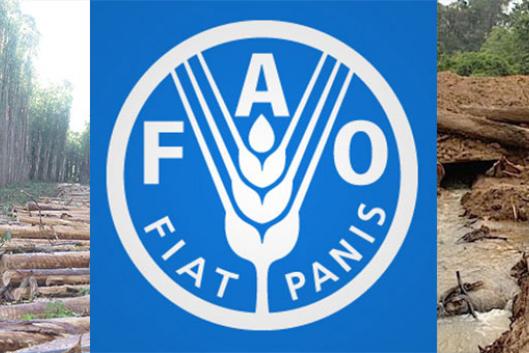Compilation of WRM Bulletin articles on the occasion of March 21st UN International Day of Forests
For decades, the WRM has demanded that the United Nation’s Food and Agriculture Organization (FAO) urgently reviews its forest definition, which mainly benefits the interests of industrial monoculture tree plantations companies. FAO’s definition reduces a forest to any area covered by trees. In doing so, the FAO definition discards other life-forms as well as the biological, cyclical and cultural diversity that define a forest in its continuous interconnection with forest-dependent communities. FAO’s reductionist definition also allows the companies behind tens of millions of industrial fast-growing plantations to claim their monocultures are “planted forests”. Countries’ forest statistics thus count these industrial monocultures as “forests”, in spite of the well-documented social and environmental impacts such plantations have caused around the world. The United Nations (UN) declared March 21st as the International Day of Forests in 2013. At the WRM, we are taking this day as another opportunity to expose FAO’s misleading forest definition.
Already in 2009, the WRM denounced in its Bulletin 141 that: “the definition of forests is not an academic or linguistic discussion: it is a political issue having serious social and environmental consequences at the ground level. Defining plantations as forests empowers the corporate sector - particularly plantation companies - and disempowers local communities opposing them to protect their livelihoods. The FAO continues playing this role by refusing to change its definition.”
FAO’s definition remains the most widely used forest definition today. It serves as a guide for national forest definitions worldwide – as we denounced in an Open Letter in 2017. It’s also the reference in international forums, such as the UN climate negotiations. Albeit speaking of forests, the 2016 UN Paris Agreement promotes the expansion of monoculture tree plantations in various ways. Tree plantations are promoted as so-called carbon sinks, dubious reforestation or restoration programmes are launched and wood is advertised as an energy source to replace fossil fuels. Because the Paris Agreement adopts FAO’s forest definition, its promotion of industrial tree monocultures is taking place under the guise of the positive image of forests.
As the WRM, together with La Via Campesina, Friends of the Earth International and Focus on the Global South, stated in an Open Letter to FAO in 2014, “The definition fails the at least 300 million women and men worldwide who, according to FAO, directly depend on forests for their livelihoods.” The FAO should take full responsibility for the strong influence its forest definition has over global economic, ecological and social policies.
Here we present a compilation of WRM Bulletin articles from 2015 until 2018 and further information that addresses the different impacts and consequences of FAO’s forest definition. We hope this compilation serves to underscore once again the importance for a change of the FAO’s definition.
Plantations are not forests!
